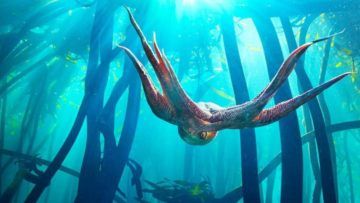Louis Proyect in Counterpunch:
 Just over five years ago, Inky the octopus became a folk hero because of his escape from a New Zealand aquarium. After squeezing through a narrow chink in his tank, he crawled across the floor and found an opening to a 164-foot-long drainpipe that led to the ocean. As much as I enjoyed the film based on Stephen King’s “The Shawshank Redemption”, which climaxes in Tim Robbin’s daring prison break, I only wish that a gifted animation team like the one that made “How to Train Your Dragon” could tell Inky’s story.
Just over five years ago, Inky the octopus became a folk hero because of his escape from a New Zealand aquarium. After squeezing through a narrow chink in his tank, he crawled across the floor and found an opening to a 164-foot-long drainpipe that led to the ocean. As much as I enjoyed the film based on Stephen King’s “The Shawshank Redemption”, which climaxes in Tim Robbin’s daring prison break, I only wish that a gifted animation team like the one that made “How to Train Your Dragon” could tell Inky’s story.
At the time, I made a mental note to myself to learn about octopuses. From the time that I read about Inky, interest in the creatures has increased dramatically with this year’s Oscar for documentary going to “My Octopus Teacher.” Nearly everybody who spends time looking at octopus YouTube videos, or going further and reading books about them, will be struck by both their intelligence and inscrutability.
…Furthermore, if intelligence is related to the amount of neurons in a creature’s brains, some attention must be paid to how they are located in an octopus’s body. Most are not in its head but in its arms. Each tentacle has millions of them that it uses to help in finding food but without the direct visual cues that go along with the eye-to-brain pathway. For an octopus, there are the usual experiments that measure a lab specimen’s IQ such as rats finding the shortest path to food in a maze or challenging a chimpanzee to place a round peg in a round hole, etc. Godfrey-Smith argues that it is much better to see an octopus’s intelligence in terms of its ability to reproduce itself in the ocean. One example is how this one carries around coconut shells that can come in handy fending off a shark’s bite.
More here. (Note: Do watch the incredible video!)
